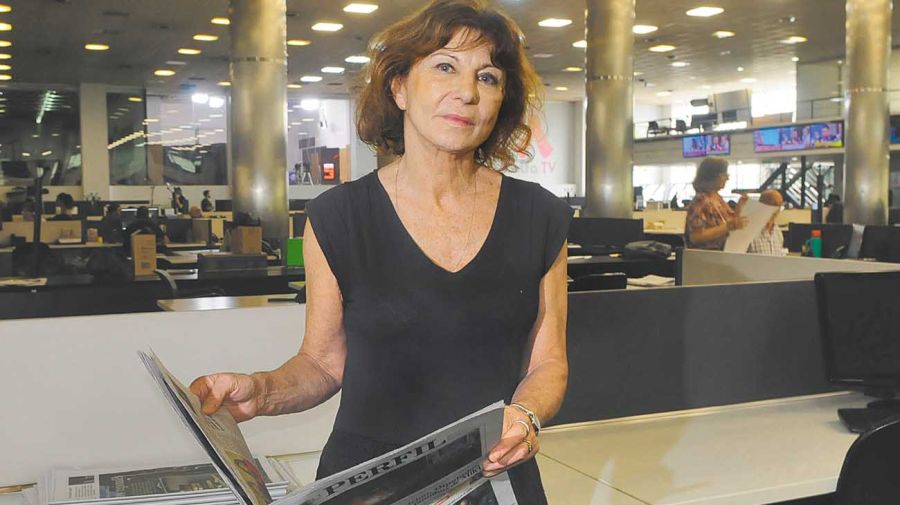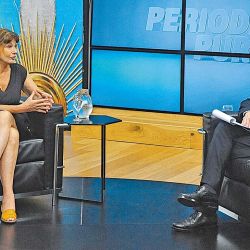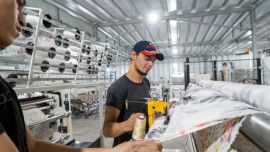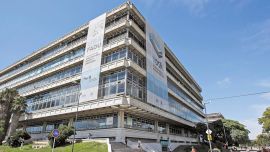Silvia Labayrú is a survivor of Argentina’s last military dictatorship (1976-1983). At the age of 20 and five months pregnant, she was kidnapped by a task force operating out of the ex-ESMA Navy Mechanics School clandestine detention centre in 1976. She was tortured, raped and obliged to perform slave labour for the naval officers during her detention.
Labayrú is sure that she was one of the first prisoners to give birth at the concentration camp, an act that took place a few floors above the place where she was regularly tortured.
Her release after 18 months of captivity and subsequent arrival in Spain seemed to mark the end of the hellish era, but the suspicions of her militant comrades as to how she got out opened up wounds that were difficult to heal.
Her story is told by Leila Guerriero in the new book La llamada, referring to the momentous telephone call which saved her life.
You were abducted, tortured and gave birth at the age of 20 on the same site where you had been tortured, raped and obliged to perform slave labour. You were held captive 18 months with your daughter as a hostage yet you managed to survive, triggering all kinds of suspicions among your militant comrades. How did you do it? And how do you live that rejection? How do you explain and come to terms with it?
At first I did not understand, it seemed incredible to me that it was happening but it did. When I was finally leaving on the aeroplane, I said to myself: “Good, hell is over for me” but it wasn’t. When I arrived in Madrid, I was under all kinds of suspicion: “Why are you alive, what did you do to stay alive?” There was a buzz around me that I had been obliged to accompany [former Navy Lieutenant-Commander Alfredo] Astiz in the notorious episodes against the Madres de Plaza de Mayo as if I had done so of my own free will, like joining a friend from the Colegio Nacional Buenos Aires on a cinema outing. So placed in that context, it was really very hard on me because I found it evident that many people among militant comrades and Argentine exiles in Europe misunderstood it. Mine was evidently not the only case of a suspicious survival, something befalling the immense majority of us survivors. That famous phrase of “We left you alive because we wanted you alive” was not because they loved us, but because our reappearing alive must have been due to our doing something, betraying or grassing on somebody. So that phrase did not work out in our case.
Has it changed over the years with greater understanding?
Yes, yes, of course. I believe that the hub of the matter was in part the passage of time, as well as many stories very similar to mine, both in ESMA and in other concentration camps, starting to become known. The fundamental key was the trials where the truth started to come out.
The survivors were fundamental for the trials because without you, it would not have been possible to prove the charges.
Indeed, we who were accused of being traitors and collaborators were the ones who permitted 800 genocides to be sent to jail. I’m sorry to be the one to say it but that’s the way it was.
Silvia, in any case you must have asked yourself: “Why me?” To what do you attribute your being among the 200 who were saved out of the 5,000, to smarter answers on your part when being tortured which resulted useful to them?
Well, that’s a good question...
Existential, I imagine.
Yes, it’s a logical question and a question which makes sense. The answer is more complicated. Basically we always say that you’d have to ask the genocides why they allowed each one of us to live because they are very different cases with very different characteristics. What they have in common is that those genocides were omnipotent at that time in Argentina and we already know that power corrupts and that absolute power corrupts absolutely. Those guys believed themselves to be gods and they were for a certain time. They could abduct, murder, torture and rape anybody they liked, whether they were political militants or not. That’s what happened at ESMA and I’m a witness. People who had absolutely no political militancy were hurled into the dungeons of ESMA, among them my ex-father-in-law, who was the conservative executive of a German multinational and head of a family which had nothing to do with politics but was there for more than a month while the younger daughter of 17 was tortured in the search for the elder sister of my then-husband. They were abducted and taken away in City Bell, that kind of thing was going on.
Do you attribute your daughter being handed over to her grandparents and not snatched as in other cases – to your father being in the Armed Forces, making for a different attitude?
Well, I didn’t give your previous question a complete answer. The reasons why we survived are very diverse and in my case more than one. I believe they are generally complex issues, that is one of the reasons. Another reason might indeed be the military origin of my family but that was not decisive because in the first months Captain [Jorge ‘Tigre’] Acosta saw me and said to me: “We’re going to grab your father, who is a traitor.” My father was [apparently] a traitor for not having grassed on me, that was the charge against him. So that was not a great help either and indeed they murdered several children of senior officers so that was basically not at first a factor. It was afterwards when the telephone call giving Leila Guerriero’s book its title came through.
I’d like to share that with readers. Acosta telephoned your father.
I was obliged to perform slave labour. A Montonero leader Mercedes Carazo helped me to live a lot because she required me as a translator for the work they were obliging her to do. They took me down to work with her and I passed from being No. 765 to being a kind of symbol as ‘the pregnant one.’ I began to have a face, a name and a surname and they started conversing with me. After four or five months until I gave birth, I had already ceased being, a number so by then what they planned doing with me – keeping me alive until my daughter was born, expropriating her, as was their custom, and then killing me – had become complicated, Mercedes Carazo insisted with Jorge Acosta that something had to be done with my baby, that the family should be called. But that man just did not answer.
Then one fine day they took me handcuffed to his office where I stood in front of him with a telephone between us and he said to me: “We’re going to talk to your father to organise the handover of the baby.” He then dialled my father's number. Luckily he was not airborne in those days. He answered and was told: “We want to talk to you about your daughter.” And my father thought that the Montoneros were calling him to talk about me and went berserk. He started saying: “Just come along here and I’ll shoot you to pieces, I’m anti-Communist, anti-Peronist and anti-Montonero and you Montoneros are morally responsible for the death of my daughter.” Well, those providential phrases which parents sometimes have are what I believe saved my life in great part because that man turned pale, hung up and said: “So your father is one of us.” He said what he had to say and from that point my life there changed quite a bit. I was still being held at ESMA but it seems that was my first passport to life.
But that telephone conversation continued, in what form?
Well, the call continued and he passed the receiver to me. I could barely speak, all I could tell him was that I was OK, that the baby would be born in a few days and that I wanted it delivered to my in-laws, the same ones who had been abducted and then released. I preferred the baby to be with them. And, of course, he [my father] would not be able to say absolutely anything about my being alive but when the baby was born, he [Acosta] would telephone them and hand it over.
“People who had absolutely no political militancy were hurled into the dungeons of ESMA.”
Why the in-laws and not your family?
In the first place, because my parents were divorced. My father was an international pilot with Aerolíneas Argentinas so often in the air and incapable [of taking charge of a child]. My mother had been taken by her husband, who was also military, a colonel, to live in Uruguay because her apartment building was run by a military consortium and every time she took the lift, she said: “You murderers of my daughter!” So her husband thought that my mother was also at risk because she was very upset by all this situation so he took her to live for a while in Uruguay. Even staying in Argentina my mother was not the most fitting person to take charge of a baby for the state she was in. That’s why I decided on my in-laws, even though they had only just been released.
In her book, author Leila Guerriero speaks for you when she says: “The survivor is always an uncomfortable and suspicious person because we know things about the human condition which are better not known. We know what happens to the soul in a situation of extreme terror.” So what happens to the soul in that situation of extreme terror?
The soul is hit hard. In my case my soul was very lonely with the predominant feeling being fear first and then loneliness, the feeling of being defenceless in the most absolute solitude and of not knowing what was going to happen the next day in such a changing world. They were such capricious people that you could end up the following Wednesday being in the queue to be tossed into the sea from the Aeroparque. So it was a situation of great uncertainty and an enormous, enormous solitude, even if surrounded by other prisoners.
But is there some difference? Does undergoing that experience leave an awareness impossible to acquire otherwise, like coming back from the dead?
Somehow, yes, there is a perception differing from life. When I was released, I had this very clear feeling that being one of the 200 survivors from the 5,000 who had been murdered and tossed into the sea was a privilege. So upon being freed, my life had added value, it had to have a meaning.
That famous “honouring life.”
Honouring life so that my life, which had already had this immense good fortune, could be a life well lived. Or so I have tried.
How did your partner manage not to be apprehended?
Basically because I didn't rat on him. He went to our date and when I finally showed up 90 minutes late, he wasn’t there. We had safety measures whereby if one of us did not show up within 15 minutes, the other had to switch to a safe house. We also had a strategy of a [false] address where we would say we lived if we got caught. I followed all the norms and my husband could sleep that night in the boarding-house where we were living before switching to the safe house at 6am the following morning. But he was not caught basically because I didn't rat on him.
You mention that although you worked for Montoneros intelligence and even tracked [former military president Leopoldo] Galtieri, you always knew that you could not carry a death on your conscience. But you were still part of it, so that you cannot feel innocent of the responsibility of belonging to an organisation which killed people. How do you see today, in retrospect, that violence of the 1970s? You criticise the organisation, something which many militants do not like to hear, and perhaps that forms part of their initially taking their distance [from you].
I am very critical, although the history of the 1970s and the youthful militancy of those years should be understood in its context, like everything else. The great idealism of the leaders, political groupings and the social movements came from the [French] May of 1968 and Che Guevara. In those years there were such movements who thought they could change the world in many countries. We too thought we were going to change the world...
When I was abducted, I had already left the organisation mentally. A few days beforehand we met up with my sister-in-law, who was also a Montonera, at our country house in City Bell and one day she showed up and said: “I’ve reached the conclusion that they’re going to kill us all.” I then looked at her and said: “So what do we do?” And she said to me: “What do we do? Stay here and die for our dead comrades.” When I heard that phrase, I realised that it was all over and that I had to go, with or without my husband, because I was a “living corpse.”
I would have left a fortnight later, even if alone and pregnant, but I was not given time. So when I arrived at ESMA and saw how things were, I was not surprised but what did surprise me was the way our organisation was sending us militants to an almost certain death. In that sense I’m very critical and I believe that I committed an important political error when very young in joining a movement which spoke of national socialism, which sounds like something else. And while in that organisation I could verify the scorn they had for life in general and the lives of their militants in particular because they did not look after them. Their leaders wrote down that their war would cost the lives of some 12,000 militants while drinking coffee in Trastevere [a bohemian working-class neighbourhood in Rome].
We were given that to read in ESMA and to them it seemed a dry statistical footnote among others, the deaths of 12,000 people in a lost cause. Because it was totally lost, that was never a war, whatever they might say …
Did you imagine when abducted that you had a future and would survive, that there was a life beyond ESMA? Did you dream at night, for example?
I thought that there was a possibility of survival but I also thought that in the following week it could be one or several or all of us ...
In an aeroplane [in the so-called ‘death flights’].
...in an aeroplane. Anything could happen and for that reason every day and every week there were like years because each day had an extraordinary intensity. They did not let us sleep, they woke us up at all hours of the night. Day and night were intermingled. Every day and every week in fear without knowing where things were going. We had the hope of surviving but no certainty at all.
“We who were accused of being traitors and collaborators were the ones who permitted 800 genocides to be sent to jail.”
Did you dream?
I don’t remember. I also believe that one of the things which helped me a lot was precisely being pregnant. When I read about the role of endorphins in the body, there is a very high production of endorphins during pregnancy which enabled me to stay more or less serene during those months in the situation I was in. I was pregnant with just a bucket for my needs, I didn’t know when my daughter was going to be born and received no medical attention during my last four months of pregnancy. They said that children were not to blame for their parents but the babies they robbed did not carry that guilt either, apart from the lack of proper medical attention.
Were there other pregnant women at the time you were pregnant there in ESMA?
Yes, there was a pregnant comrade who gave birth very shortly before me in the Naval Hospital. I was the first, I believe, to give birth at ESMA – not on the table on which they had tortured me but on a table three floors lower which was later converted into what they called the Sardá maternity ward, where they took the pregnant women from other [concentration] camps to give birth before robbing the babies and returning the mother to the camp from whence she came or placing her on the following Wednesday’s list.
Silvia, tell us how you were obliged to accompany Astiz when he infiltrated the Madres de Plaza de Mayo. Tell it to us as if it were a journalistic record, how it was proposed to you, what they told you to do, what you saw, what was done.
Astiz had been infiltrating the Madres de Plaza de Mayo for several months because for those people the existence of such a movement was unbearable to them. They thought, as they did with every movement, that the Montoneros or some Marxist grouping had to be behind the Madres, instigating them, and that they therefore had to be infiltrated because there was surely an armed organisation behind them.
So they looked for the name of a missing person and made him [Astiz] pass himself off as Gustavo Niño, the brother of a missing person. He went several times to the Plaza [de Mayo] and befriended the Madres because he was a well-bred young man. At a given moment, they decided that in order to back up the infiltration, it would be good to have somebody who could pass themselves off as his sister. So they chose a girl named Norma Burgos, who was the wife of Carlos Caride, a guerrilla leader. Since that girl was very swarthy, she took advantage of that to argue that nobody would believe that she could be the younger sister of Astiz due to her physical appearance and furthermore, somebody might recognise her. So they did not send her any more, deciding that of all their prisoners, I was five years younger [than Astiz], blonde and blue-eyed and the ideal person to be the bimbo younger sister of Astiz. They took me to two or three meetings, one in La Boca [dockland neighbourhood] to a place where I do not think I had ever been before.
At one of those meetings the French nun Alice Domon, who was a human rights militant, displayed a pamphlet of a party called the Marxist-Leninist Communist Party, which was a non-violent, theoretical party, and that gave them their proof that there really was an infiltration of Marxist movements. That led them to seize the whole group in an incredible move which I could not believe.

We’ll now enter into the chapter of rape, which you are free to answer or not. In 2011 along with two other women you presented rape charges against ‘Tigre’ Acosta, who was in charge of all ESMA prisoners while you were there, and against Alberto González, the officer in charge. They were convicted specifically on that sexual charge. How do you feel about that conviction, what prompted you to initiate it and how do you see it today in hindsight?
That trial mattered a great deal to me, more than any other, although I have testified for hours and hours and hours in a whole bunch of trials. But this trial touched me personally, as soon as the possibility arose of prosecuting it as a crime apart, I went for it and said ‘yes’ immediately, only that this trial was shelved for a very long time. I thought that it was never going to move ahead but at a given moment it was revived.
“It caused them a certain perverse pleasure to rape the women of famous Montonero guerrillas, as I understand it, gave them an extra kick.”
Did you relive the rape? Did the arguments of the lawyers also have a sadistic aim?
Today’s prosecutors and judges are very different from 30 or 40 years ago when I testified and it seemed like I was the accused. Now it has changed a great deal and is far more respectful. Even so there are still questions which I don’t understand why they were asked and afterwards were explained to me but they said: “How many times were you raped?” “Look, I don’t know how often,” I answered. “But more than 10 [times> or less?” “More than 10.” “And how and where was the first time? What did they say to you? What happened? And the second? And the third? And the fourth?” I said: “Look, I did not keep a notebook recording how rape number one and rape number two had been.” And yet afterwards they explained to me that they had to ask those questions because a rape repeated more than 10 times has judicially another level of punishment and it is indeed barbarous.
Is Alberto González still alive? How old is he and what was his participation?
He was an intelligence officer. I was 20 and he was 25 and so you have some idea, the guards who gave us mate cocido in the morning and then kicked our heads in later in the day were between 15 [hours] and 17 [hours].
Were they non-commissioned officers?
They were ESMA [Escuela de Mecánica de la Armada] cadets at the ESMA naval engineering academy next door. My grandfathers were both NCOs there so there was a strong connection. Alberto González was 25, an intelligence officer and had singled me out as a sex object. He’s alive and has, I believe already accumulated three life sentences for crimes against humanity along with other sentences of between 20 and 25 years.
So the case against Alberto González and ‘Tigre’ Acosta was for being the authors, not the perpetrators.
Exactly, because he told me what was going to happen and that I had to accept it … we detainees had somehow to prove that we did not hate them and the best way to prove it was to have an affair with some officer. With marriage to my husband being sacrosanct, of course, were I to be released, I would return to my husband and my family with nothing having happened here [at ESMA] but it was going to happen.
But did they tell you that seriously?
Yes, yes, as a very normal thing. It had to be that way and it was going to be that way and that he was not making the offer himself because he was too old. I was dumbstruck. Time went by and...
So it was a policy, not just the case of Alberto González, of every naval officer picking a sex object.
Exactly, exactly. Furthermore, it caused them a certain perverse pleasure to rape the women of famous Montonero guerrillas, as I understand it, gave them an extra kick and in some cases they even said: “We’ll show all these women what a man is.”
You said that it took you many years to realise that you had been raped. Above all, that you had also been raped by a woman, the wife of your tormentor Alberto González, who used you to satisfy “the sexual desires of the couple.” Were you unaware at that time that you were being raped because you took it as part of the torture?
Yes, at first I took it in a certain way as part of the torture but the fact of having been obliged to participate in the erotic games of that couple made me see very clearly that what those people were doing had absolutely nothing to do with the antisubversive struggle.
Of what use is being raped by the wife of an officer to the anti-subversive struggle? What does it have to do with it? They so Christian and so ethical, all serving to be raped by the wife of a naval officer. And it also strikes my attention, although it is complicated to say so nowadays, but after having also been raped by the wife of that man, it took me a long time to understand that she too was a rapist but when I understood, I understood. But the press did not pick it up.
Did the courts?
Yes, the courts ...
And was she convicted too?
No, no, I did not initially accuse her, I accused González and at his trial I testified that I had also been raped by her but she was not placed on trial. Yet it very much struck my attention that the press did not pick it up, it is as if they did not want to accept that very occasionally, women can also rape too.
Did anybody ever beg your pardon?
No, pardon, no, quite the contrary. If they could kill me right now, they would, that’s quite clear, as a fundamental enemy.
Pardon the indiscretion and again you have the right not to reply, but it is unclear whether the coupling took place at ESMA.
No, they took me away from there and in fact to their home two or three times. And that took place with their two-year-old daughter sleeping in the next room.
So they had the possibility of taking away prisoners as if they were objects.
Of course, sometimes they took us out to dinner in groups of between five and eight, making us dress up for the occasion with the clothes of other dead prisoners. They took us out to dinner and small talk. Then they took us back to ESMA and chained us up.
To what do you attribute such attitudes, did they serve some end as part of the torture, making you sniff liberty and then taking you back as a form of sadism?
I believe that there was a bit of all that. They believed themselves to be the owners of everything, in a situation which enabled them to do anything. They believed themselves to be national heroes, tremendously unaware, travelling around Europe and thinking that their activity was really patriotic and heroic. They were carrying out a combat against the Marxist enemy, etc. and the good thing which has happened, as I have said before, that while the struggle of the 1970s did not lead anywhere, its results for today’s youth in Argentina, although I could be wrong, have been incarnated in ‘Nunca Más’ so something has been achieved. Which is to say that all that sacrifice and death and pain has served towards a democratic apprenticeship. Thanks to [1983-1989 President Raúl] Alfonsín in the first stage and the human rights organisations, it has become possible for certain ideas of ‘Nunca Más’ to take root. And I believe that there is not the slightest possibility of today’s youth in Argentina consenting to or supporting movements of this [anti-democratic] type. I could be wrong but the truth is that I think that to be firmly rooted.
I’m going to ask you to reflect on this Argentina, a country which has been progressively forgetting what happened in the 1970s while those under 40 think that democracy always existed. Today we have a president who as a candidate in the debate used the same vocabulary as [the junta’s Emilio] Massera of war and excesses together with a denialist vice-president.
This reappearance of denialism has surprised me greatly because, as I said before, Argentina has achieved a great international prestige in terms of human rights so to go denying or knocking something which has obtained international recognition for Argentina, seems somewhat absurd to me. They also have scant possibilities, I trust, of doing what they say they want to do. [Vice-President Victoria] Villarruel wants to turn ESMA into something of an amusement park. Over and above her intentions, that is judicially impossible.
It’s a World Heritage Site.
A World Heritage Site.
Production: Melody Acosta Rizza & Sol Bacigalupo.























Comments